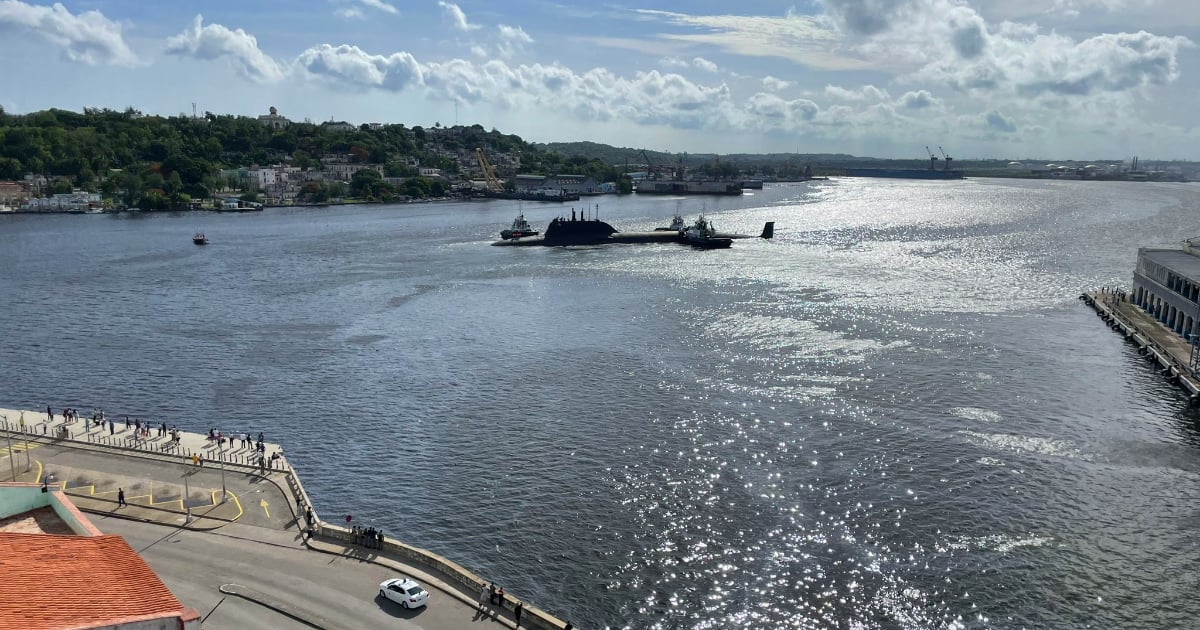After five days docked in Havana Bay, the Russian nuclear-powered submarine Kazan set sail this Monday, heading into the Caribbean waters and leaving a trail of controversy with its visit to Cuba. "Happening now: the Russian nuclear-powered submarine Kazan leaves Havana. Next stop...?" stated Patrick Oppmann, CNN's correspondent in Havana, on his X account.
Oppmann's post included a photo of the massive vessel, which was escorted by several tugboats from the Havana port. The Kazan arrived in Cuba last Wednesday, June 12, as part of a flotilla from the Russian Navy composed of four ships, generating significant geopolitical interest.
Geopolitical Implications and Military Movements
In addition to the Kazan, the flotilla included the tanker Pashin, the rescue tug Nikolai Chiker (SB-131) from the Northern Fleet, and the frigate "Admiral Gorshkov," the flagship of the Russian Federation Navy group.
The Cuban Ministry of Foreign Affairs (MINREX) emphasized that the visit aligned with the "historic friendship between Cuba and the Russian Federation" and adhered "strictly to international regulations to which Cuba is a signatory." They also clarified that none of the vessels carried nuclear weapons and that their presence posed no threat to the region.
However, upon the flotilla's approach to Cuban shores, the U.S. government deployed several warships and a submarine reconnaissance aircraft to monitor the Russian fleet's movements. This summer, Russia is expected to conduct extensive naval and aerial activities in the Caribbean, near the United States, culminating in a global naval exercise in the fall, according to U.S. government sources.
Despite these developments, the Biden administration stated that they did not view the deployment with concern, noting that Russia has sent ships to the Western Hemisphere annually from 2013 to 2020. "Russia's deployments are part of routine naval activity," said U.S. officials, adding that they do not pose a direct threat to the United States.
U.S. Response and Strategic Positioning
The day after the Kazan entered Cuban waters, the U.S. Southern Command confirmed the arrival of the nuclear submarine USS Helena at Guantanamo Bay. "The fast-attack submarine USS Helena is in Guantanamo Bay, Cuba, as part of a routine port visit while transiting the U.S. Southern Command's geographic area of responsibility, conducting its global maritime security and national defense mission," the Command said in a statement.
Although the Cuban regime acknowledged prior notification of Helena's journey to Guantanamo, it expressed discontent with the vessel's presence. "Obviously, we do not like the presence on our territory and transiting through our waters of a means of that nature, belonging to a power that maintains an official and practical policy that is hostile toward Cuba," added a senior official from the Cuban Foreign Ministry.
In contrast, Cuban leader Miguel Díaz-Canel warmly welcomed the Russian fleet, sharing images of his visit to the flotilla of his strategic ally Vladimir Putin on social media. "Welcome, friends from Russia," he stated.
Key Questions on the Russian Submarine Visit to Cuba
Given the geopolitical implications and military movements surrounding the visit of the Russian nuclear-powered submarine Kazan to Cuba, several questions arise. Here are some key queries and their answers:
Why did the Russian submarine Kazan visit Cuba?
The Kazan's visit was part of a scheduled deployment by the Russian Navy, involving a flotilla of four ships. The visit highlighted the historical friendship between Cuba and Russia and adhered to international regulations.
How did the United States respond to the Russian naval presence?
The U.S. government deployed warships and a reconnaissance aircraft to monitor the Russian flotilla. Additionally, the nuclear submarine USS Helena arrived at Guantanamo Bay as part of a routine port visit.
What was Cuba's official stance on the presence of the USS Helena?
While Cuba acknowledged prior notification of the USS Helena's visit, it expressed discontent with the presence of a vessel from a power it considers hostile.
